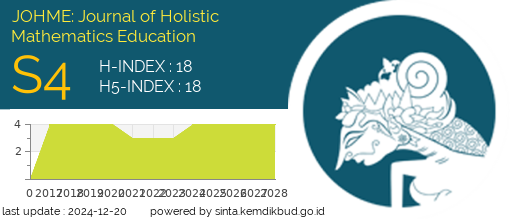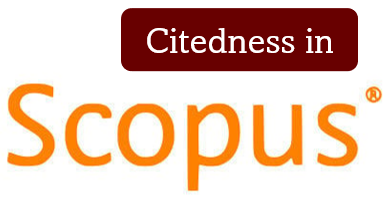IMPLEMENTASI STRATEGI INTEGRASI IMAN DAN PEMBELAJARAN JOHN W. TAYLOR DALAM PEMBELAJARAN MATEMATIKA PADA MATERI BILANGAN [THE IMPLEMENTATION OF JOHN W. TAYLOR'S FAITH AND LEARNING INTEGRATION STRATEGY IN LEARNING MATHEMATICS ON NUMBERS]
DOI:
https://doi.org/10.19166/johme.v4i1.1987Keywords:
learning strategies, faith and learning integration, John W. Taylor's model, mathematics learning, numbers, Christian teachers, strategi pembelajaran, integrasi iman dan pembelajaran, model John W. Taylor, pembelajaran matematika, materi bilanganAbstract
Humans need to receive education in their lives. Through education, humans can develop specifically in intellectual matters. Christian education has the important purpose of introducing God in Bible-based learning. But this only happens if the teacher has implemented biblical integration in learning. One way to do this is through the implementation of John W. Taylor's faith and learning integration strategy. This study focuses specificially on the learning of mathematics in the area of numbers. Christian teachers can truly carry out their call to preach Christ in number mathematics using John W. Taylor's faith and learning integration strategy. This scientific paper is a literature study with supporting data in the form of books, journal articles, and the results of observations and interviews that the author encountered at a Christian school in Ambarawa. This literature review shows that the implementation of John W. Taylor's faith and learning integration strategy in number mathematics can increase students' biblical insights. Students seem to be more enthusiastic learning about knowing God through the learning of number mathematics. It is recommended that teachers implement John W. Taylor strategy with a correct understanding of the steps for its application and make good preparations before teaching.
BAHASA INDONESIA ABSTRACT: Manusia perlu menerima pendidikan di dalam kehidupannya. Melalui pendidikan, manusia dapat berkembang terkhusus dalam hal intelektual. Pendidikan Kristen memiliki tujuan yang penting untuk memperkenalkan Allah di dalam pembelajaran yang berlandaskan alkitab. Namun fakta yang terjadi adalah guru belum mengimpelementasikan integrasi alkitabiah di dalam pembelajaran. Salah satu alternatif yaitu melalui implementasi strategi integrasi iman dan pembelajaranJohn W. Taylor. Topik bahasan ini mengarah pada pembelajaran matematika materi bilangan. Tujuan studi literatur ini yaitu agar guru Kristen dapat benar-benar menjalankan panggilannya untuk memberitakan Kristus khusunya di dalam pembelajaran matematika materi bilangan melalui strategi integrasi iman dan pembelajaranJohn W. Taylor. Penulisan studi literatur ini murni kajian literatur dengan data pendukung berupa buku, jurnal, serta hasil observasi dan wawancara yang sesuai dengan persoalan penulis di sekolah Kristen di Ambarawa. Sumber pendukung Kajian literatur ini memperoleh hasil bahwa implementasi strategi integrasi iman dan pembelajaranJohn W. Taylor dalam pembelajaran matematika materi bilangan dapat menambah wawasan alkitabiah siswa. Siswa terlihat lebih antusias mengikuti pembelajaran mengenai pengenalan akan Allah di melalui pembelajaran matematika materi bilangan ini. Disarankan agar guru mengimplementasikan strategi John W. Taylor ini dengan pemahaman yang benar akan langkah-langkah penerapannya serta melakukan persiapan yang baik sebelum mengajar.
References
Adhi, Y., Winardi, Y., & Listiani, T. (2018). Penerapan model integrasi biblika Bryan Smith tahap 2 pada pembelajaran matematika untuk meningkatkan pemahaman Wawasan Kristen Alkitabiah (WAK) siswa kelas XI IPA-2 di suatu SMA di Toraja [The implementation of the Bryan Smith stage 2 biblical integration model in learning mathematics to improve the understanding of a Biblical Christian Worldview (BCW) of grade 11 Science-2 students in a high school in Toraja]. JOHME: Journal of Holistic Mathematics Education, 2(1), 45-56. https://doi.org/10.19166/johme.v2i1.979
Appiah, J., & Wa-Mbaleka, S. (2015). Integrating faith and learning in distance education in the Ghanaian context. Feature Journal: International Forum, 18(2), 83-104. Retrieved from https://www.researchgate.net/profile/John_Appiah6/publication/329761082_Ensuring_Integration_of_Faith_and_Learning_in_Distance_Learning_in_Africa/links/5c90d30745851564fae71637/Ensuring-Integration-of-Faith-and-Learning-in-Distance-Learning-in-Africa.pdf?
Badley, K. (2009). Clarifying "Faith-learning integration": Essentially contested concepts and the concept-conception distinction. Journal of Education and Christian Belief, 13(1), 7-17. https://doi.org/10.1177/205699710901300103
Criswell, W. (2006). Pencipta & penebus (Teologi & Kristologi). Tangerang, Indonesia: Sekolah Tinggi Teologi Injili Philadelphia.
Dockery, D. S. (1998). The integration of faith and learning: A basic bibliography. Jackson, TN: Union University.
Fowler, J. A. (2005). Man as God intended: A theological survey from an anthropological perspective. Fallbrook, CA: C. I. Y. Publishing.
Hardini, I., & Puspitasari, D. (2012). Strategi pembelajaran terpadu (Teori, konsep, & implementasi). Yogyakarta, Indonesia: Familia.
Hasratuddin. (2016). Membangun karakter melalui pembelajaran matematika. Jurnal Paradikma, 6(2), 130-141. Retrieved from http://digilib.unimed.ac.id/960/
Indah, Akina, & Anggaini. (2016). Peningkatan kemampuan siswa pada materi lambang bilangan dengan menggunakan kartu bilangan di kelas I SDN 2 Kalubata. Jurnal Kreatif Tadulako Online, 4(4), 228-241. Retrieved from https://media.neliti.com/media/publications/113730-ID-peningkatan-kemampuan-siswa-pada-materi.pdf
Ismadi, J. (2009). Bilangan bulat. Jakarta, Indonesia: Buana Cipta Pustaka.
Jang, Y. J. (2012). Faith and learning: Integration as implemented by Christian elementary school teachers. CSE, 15(2), 11-15. Retrieved from https://www.acsi.org/docs/default-source/documents/cse/12227.pdf?sfvrsn=60dba63f_2
Juntak, J. N. S. (2019). Pengaruh pemahaman panggilan guru Kristen terhadap pemberitaan Injil. EPIGRAPHE: Jurnal Teologi dan Pelayanan Kristiani, 3(1), 9-12. https://doi.org/10.33991/epigraphe.v3i1.44
Khanifatul. (2014). Pembelajaran inovatif: Strategi mengelola kelas secara efektif dan menyenangkan. Yogyakarta, Indonesia: Ar-Ruzz Media.
Knight, G. R. (2009). Filsafat & pendidikan. Tangerang, Indonesia: UPH Press.
MacKay, B. B. (2012). The integration of faith, learning and life. Faculty Integration Papers, 1, 1-13. Retrieved from https://digitalcommons.cedarville.edu/faculty_integration_papers/1/
Mintasih, D. (2016). Merancang pembelajaran menyenangkan bagi generasi digital. Jurnal el-Tarbawi, 9(1), 39-48. Retrieved from https://docplayer.info/83090143-Merancang-pembelajaran-menyenangkan-bagi-generasi-digital.html
Nurdyansyah, & Fahyuni, E. F. (2016). Inovasi model pembelajaran sesuai kurikulum 2013. Sidoarjo, Indonesia: Nizamia Learning Center.
Nyabwari, B. G., Katola, M. T., & Muindi, D. (2013). Holistic Christian education for character formation in Seventh-Day Adventist Church sponsored secondary schools in Nyamira County, Kenya. Retrieved from https://www.africansdahistory.org/wp-content/uploads/2018/11/holistic-christian-education.....pdf
Nyamai, D. K. (2018). Role of the hidden curriculum in faith, learning, and living integration processes. European Journal of Social Sciences Studies, 3(1), 137-151. Retrieved from https://oapub.org/soc/index.php/EJSSS/article/view/392/971
Permatahati, F. D., Susanto, & Kurniati., D. (2015). Analisis proses berpikir siswa tuna grahita ringan kelas VIII dalam menyelesaikan masalah pembagian di SMP Inklusi TPA Jember. UNEJ: Jurnal Edukasi, 2(1), 27-31. Retrieved from https://jurnal.unej.ac.id/index.php/JEUJ/article/view/3510/2724
Pratiwi, I. A., Ardianti, S. D., & Kanzunnudin, M. (2018). Peningkatan kemampuan kerjasama melalui model project based learning (PjBL) berbantuan metode edutainment pada mata pelajaran ilmu pengetahuan sosial. Refleksi Edukatika: Jurnal Ilmiah Kependidikan, 8(2), 177-182. https://doi.org/10.24176/re.v8i2.2357
Purnama, M. D., Irawan, E. B., & Sa’dijah, C. (2017). Pengembangan media box mengenal bilangan dan operasinya bagi siswa kelas 1 di SDN Gadang 1 kota Malang. JKPM: Jurnal Kajian Pembelajaran Matematika, 1(1), 46-51. Retrieved from http://journal2.um.ac.id/index.php/jkpm/article/view/587/480
Raharja, S., Wibhawa, M. R., & Lukas, S. (2018). Mengukur rasa ingin tahu siswa [Measuring students' curiosity]. Polyglot: Jurnal Ilmiah, 14(2), 151-164. https://doi.org/10.19166/pji.v14i2.832
Rosita, I., & Leonard. (2015). Meningkatkan kerjasama siswa melalui pembelajaran kooperatif tipe think pair share. Jurnal Formatif, 3(1), 1-10. Retrieved from https://journal.lppmunindra.ac.id/index.php/Formatif/article/view/108/105
Roso, C. G. (2015). Faith and learning in action: Tangible connections between biblical integration and living the Christian life. Justice, Spirituality, & Education Journal, 3(1), 60-70. Retrieved from https://digitalcommons.biola.edu/cgi/viewcontent.cgi?article=1019&context=jsej
Roso, C. G. (2018). Faith and learning integration: Who should it serve? Journal of Christian Higher Education, 1. Retrieved from https://www.cct.edu.tw/JCHE/20190826/01.pdf
Saleh, A. (2018). Mengenal lebih dekat bilangan. Jakarta, Indonesia: PT. Glory Offset Press.
Saragih, M. J., Hidayat, D., & Tamba, K. P. (2019). Implikasi pendidikan yang berpusat pada Kristus dalam kelas matematika [The implications of Christ-center education for mathematics classes]. JOHME: Journal of Holistic Mathematics Education, 2(2), 97-107. https://doi.org/10.19166/johme.v2i2.1695
Sholihah, D. A., & Mahmudi, A. (2015). Keefektifan experiential learning pembelajaran matematika MTs materi bangun ruang sisi datar. Jurnal Riset Pendidikan Matematika, 2(2), 175-185. https://doi.org/10.21831/jrpm.v2i2.7332
Staley, O. (2015). Integrating faith in second language acquisition curricula: A case study. Procedia: Social and Behavioral Sciences, 174, 3724-3729. https://doi.org/10.1016/j.sbspro.2015.01.1105
Sugilar, H. (2017). Daya matematis mahasiswa program studi pendidikan matematika. JNPM (Jurnal Nasional Pendidikan Matematika), 1(1), 97-108. https://doi.org/10.33603/jnpm.v1i1.252
Suganda, A. (2019). Pentingnya bilangan bulat: Suplemen belajar mandiri siswa SMP/MTS kurikulum 2013 . Yogyakarta, Indonesia: Deepublish.
Sumardi, Rahman, T., & Gustini, I. S. (2017). Peningkatan kemampuan anak usia dini mengenal lambang bilangan melalui media playdough. Jurnal PAUD Agapedia, 1(2), 190-202. https://doi.org/10.17509/jpa.v1i2.9359
Suprihatiningrum, J. (2013). Strategi pembelajaran: Teori & aplikasi. Yogyakarta, Indonesia: Ar-Ruzz Media.
Suriansyah, A., Aslamiah, Sulaiman, & Noorhafizah. (2014). Strategi pembelajaran. Jakarta, Indonesia: PT Raja Grafindo.
Suwarno. (2014). Menumbuhkembangkan pemahaman Alkitab dalam mewujudkan manajeman berbasis sekolah terhadap siswa sekolah dasar. Jurnal Pendidikan Indonesia, 3(2), 128-132. Retrieved from http://download.garuda.ristekdikti.go.id/article.php?article=585204&val=7729&title=MENUMBUHKEMBANGKAN%20PEMAHAMAN%20ALKITAB%20DALAM%20MEWUJUDKAN%20MANAJEMAN%20BERBASIS%20SEKOLAH%20TERHADAP%20SISWA%20SEKOLAH%20DASAR
Taylor, J. W. (2001). Strategies for integrating faith and learning. Journal of Adventist Education, 33, 629-636. Retrieved from https://christintheclassroom.org/vol_33/33cc_629-636.pdf
Taylor, J. W. (2011). Instructional strategies for the integration of faith and learning. Journal of Adventist Education, 27, 409-425. Retrieved from https://christintheclassroom.org/vol_27/27cc_409-425.pdf
Taylor, J. W. (2012). A biblical foundation for integrating faith and learning. Journal of Adventist Education, 21(2), 8-14. Retrieved from http://circle.adventist.org/files/jae/en/jae201274050807.pdf
Taylor, J. W. (2017). A biblical foundation for the integration of faith and learning. Journal of Adventist Education, 27, 395-408. Retrieved from http://christintheclassroom.org/vol_27/27cc_395-408.pdf
Taylor, J. W., Lapat, L., & Oberholster, F. (2001). Strategies for integrating faith in mathematics. Journal of Adventist Education, 9-11. Retrieved from http://circle.adventist.org/files/CD2008/CD1/jae/en/jae200163050903.pdf
Tinkey, P. (2010). Student perceptions of the integration of faith and learning in a college foreign language course (Doctoral dissertation, Duquesne University). Retrieved from https://dsc.duq.edu/cgi/viewcontent.cgi?article=2301&context=etd
Van Dyk, J. (2013). Surat-surat untuk Lisa. Tangerang, Indonesia: UPH Press.
Wahyuni, S. (2019). Ayo, mempelajari semesta bilangan. Jakarta, Indonesia: PT Sunda Kelapa Pustaka.
Widodo, H. (2019). Mengenal bilangan spesial. Semarang, Indonesia: Penerbit Mutiara Aksara.
Wille, J. J. (2012). Occurrence of Fibonacci numbers in development and structure of animal forms: Phylogenetic observations and epigenetic significance. Natural Science, 4(4), 216-232. https://doi.org/10.4236/ns.2012.44033
Yanti, G. I., Setyaningsih, N., & Kholid, M. N. (2016). Dampak strategi pembelajaran ditinjau dari kemampuan awal terhadap hasil belajar matematika siswa SMP. Retrieved from http://eprints.ums.ac.id/42820/1/Naskah%20Publikasi.pdf
Downloads
Published
How to Cite
Issue
Section
License
Authors who publish with this journal agree to the following terms:
1) Authors retain copyright and grant the journal right of first publication with the work simultaneously licensed under a Creative Commons Attribution License (CC-BY-SA 4.0) that allows others to share the work with an acknowledgement of the work's authorship and initial publication in this journal.
2) Authors are able to enter into separate, additional contractual arrangements for the non-exclusive distribution of the journal's published version of the work (e.g., post it to an institutional repository or publish it in a book), with an acknowledgement of its initial publication in this journal.
3) Authors are permitted and encouraged to post their work online (e.g., in institutional repositories or on their website). The final published PDF should be used and bibliographic details that credit the publication in this journal should be included.”










